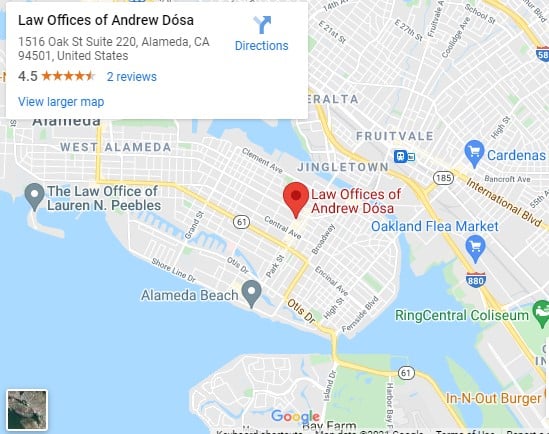Assault and Battery Attorney in Alameda County, CA
It isn’t very uncommon for us to hear about assault and battery cases. With violent crimes on the rise, these terms have been thrown around casually. But what do these really entail?
Assault and battery both pertain to the intent to do harm upon another individual. The degree of the harm along with the weapon used are what can escalate the case.
Having an assault and battery attorney in Alameda County, CA can help straighten out matters.
California state law takes physical violence seriously, and there are three types that can lead to charges of assault and battery.
A simple assault is an unlawful attempt to cause physical injury to another person, while battery includes threatening and attempting to commit an assault and battery.
However, these charges can be elevated if the prosecution can show that there’s an aggravating circumstance to do so. If you’re facing charges of assault and battery, make sure to contact a local criminal defense attorney immediately.
Experienced Alameda County, CA Assault and Battery Attorney
Have you been charged with assault and battery in California? It’s hard to defend yourself when your life has been turned upside down and you don’t know what to do.
Fortunately, our experienced Alameda assault and battery attorney can help you get your life back on track!
The Law Offices of Andrew Dósa has helped thousands of clients in Alameda County and more areas in California with defending their rights for over 20 years – from DUI charges to estate planning needs, personal injury claims, civil litigation, and more!
When you have a criminal charge against you, it’s worth every penny to get help from experienced California criminal defense lawyers. Schedule a consultation today to get help with your criminal charge in Alameda County, CA.
Why do I need an Assault and Battery Attorney in CA?
 It is often noted that assault and battery are like salt and pepper, one is a lot like the other and the two always go together. Given its nuanced nature, many quite confuse assault for battery.
It is often noted that assault and battery are like salt and pepper, one is a lot like the other and the two always go together. Given its nuanced nature, many quite confuse assault for battery.
To simplify its definition, assault is the act of placing fear in the victim with physical harm being imminent while battery is the act of physically harming the victim, thus completing the assault.
Assault and battery cases can be quite difficult to handle, which is why if you have been charged with an assault and battery case in California, it is best to get in touch with a criminal defense attorney from The Law Offices of Andrew Dosa.
The law office’s attorney has over two decades of legal experience in fields ranging from estate planning to criminal defense and is more than equipped to handle your case.
What is Assault and Battery?
The term assault has been repeatedly used and some may even confuse it with battery. While these two often go together, it is to be noted that they are quite different from each other. Assault is defined by the California Penal Code s.240 as an “unlawful attempt, coupled with a present ability, to commit a violent injury on the person of another”.
Battery, on the other hand, is legally defined in the California Penal Code s.242 as “any willful and unlawful use of force or violence upon the person of another”. To make it short, battery is the completion of assault since physical harm or force has already taken place.
Learn more about assault and battery, what penalties you stand to face, and how an assault and battery attorney can help you.
What are the Penalties for Assault and Battery?
Assault and battery can be charged as either a simple or aggravated case.
A simple assault charge is treated as a misdemeanor punishable by up to six months in county jail, $1000 fine, probation, plus restitution to the victim.
On the other hand, battery can be charged as either a misdemeanor or felony, depending on the nature of the alleged offense. As a misdemeanor, battery is punishable by six months in county jail and a $2,000 fine.
For a felony battery conviction, the maximum penalty is three years in prison, a fine of $2,000 to $10,000, probation, and restitution to the victims.
Note that penalties and sentencing for a convicted offender may vary depending on the severity of the crime, aggravating circumstances, and the criminal history of the defendant.
What are the Common Defenses Used in Assault and Battery?
The common defenses used in assault and battery include self-defense, defense of others, consent, and defense of property.
- Self-Defense: The most common defense used in assault and battery cases is self-defense. The defendant must show that there was a threat or unlawful force against them, there was a perceived harm, and there was no way to escape the imminent threat.
- Defense of Others: This kind of defense is starkly similar to the first, only it is to defend another person whom the defendant perceives is under threat of being a victim to assault and battery.
- Consent: Consent is an available defense in assault and battery charges, meaning that if an individual has given consent to an act then it cannot count as assault and battery. These are closely evaluated by courts and such harmful behaviors, even with permission, are still punishable under assault and battery laws.
- Defense of Property: This can be used as a defense in situations wherein one’s property is being illegally withheld from them.
Call our Assault and Battery Attorney Now!
Assault and battery are serious cases that can pose grave punishments when convicted. Regardless, if you are facing charges for assault and battery, know that it is within your rights to have an attorney.
Enlist the help of a criminal defense lawyer from the Law Offices of Andrew Sosa. An assault and battery attorney with over two decades of experience can inform you of your rights, represent and defend you in court, and ensure that you get the best possible outcome for your cause.



